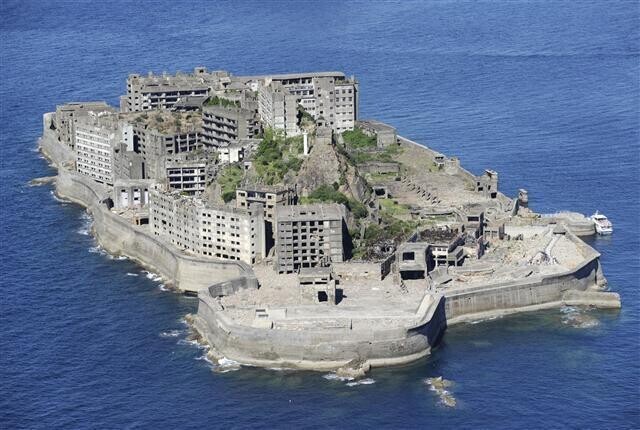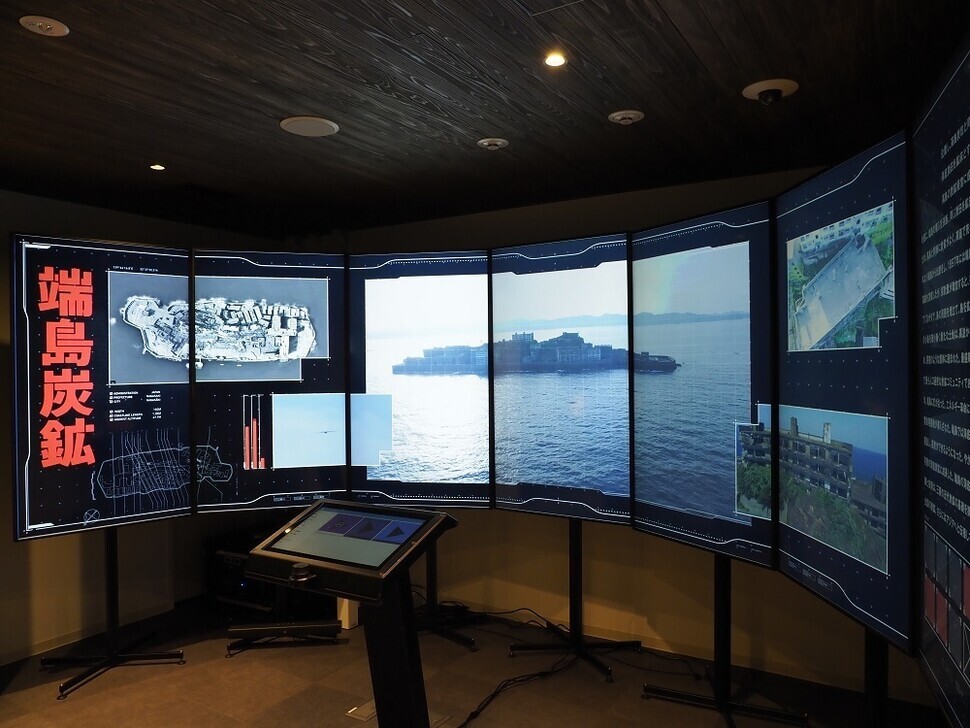hankyoreh
Links to other country sites 다른 나라 사이트 링크
S. Korea to send letter to UNESCO protesting Japanese exhibition on Gunkanjima Island

The South Korean government appears to be preparing to send an emergency letter to UNESCO to raise issues over distorted historical content related to Gunkanjima (Hashima) Island exhibited at an industrial heritage information center in Tokyo.
On June 16, the Ministry of Foreign Affairs (MOFA) announced that it was “considering various measures, including sending a letter to UNESCO.” At the time of its registration of Gunkanjima and 22 other modern industry sites in Japan on the World Heritage List in 2015, Japan acknowledged that many Koreans had been forced by the Japanese empire to work at sites including Gunkanjima. But the industrial heritage information center unveiled on June 14 included only eyewitness accounts and archival materials that denied the existence of forced labor by Koreans. MOFA plans to complain to UNESCO about the distortion of history by Japan.

“In addition to considering whether to send a letter from the government, we also plan to engage in diplomatic efforts to share the message locally about Japan’s problematic behavior through the South Korean ambassador to UNESCO and other means,” a MOFA official said.
The South Korean public also plans to raise the issue at the 44th World Heritage Commission meeting, which has been postponed until November due to the COVID-19 pandemic. A day earlier on June 15, MOFA summoned Japanese Ambassador to South Korea Koji Tomita to strongly protest the absence of any exhibit commemorating victims of forced labor -- despite a previous pledge from the Japanese government that the center would be established as a measure to remember the victims -- and to urge immediate corrective action.
By Noh Ji-won, staff reporter
Please direct comments or questions to [english@hani.co.kr]

Editorial・opinion
![[Editorial] Penalties for airing allegations against Korea’s first lady endanger free press [Editorial] Penalties for airing allegations against Korea’s first lady endanger free press](https://flexible.img.hani.co.kr/flexible/normal/500/300/imgdb/original/2024/0502/1817146398095106.jpg) [Editorial] Penalties for airing allegations against Korea’s first lady endanger free press
[Editorial] Penalties for airing allegations against Korea’s first lady endanger free press![[Editorial] Yoon must halt procurement of SM-3 interceptor missiles [Editorial] Yoon must halt procurement of SM-3 interceptor missiles](https://flexible.img.hani.co.kr/flexible/normal/500/300/imgdb/child/2024/0501/17145495551605_1717145495195344.jpg) [Editorial] Yoon must halt procurement of SM-3 interceptor missiles
[Editorial] Yoon must halt procurement of SM-3 interceptor missiles- [Guest essay] Maybe Korea’s rapid population decline is an opportunity, not a crisis
- [Column] Can Yoon steer diplomacy with Russia, China back on track?
- [Column] Season 2 of special prosecutor probe may be coming to Korea soon
- [Column] Park Geun-hye déjà vu in Yoon Suk-yeol
- [Editorial] New weight of N. Korea’s nuclear threats makes dialogue all the more urgent
- [Guest essay] The real reason Korea’s new right wants to dub Rhee a founding father
- [Column] ‘Choson’: Is it time we start referring to N. Korea in its own terms?
- [Editorial] Japan’s rewriting of history with Korea has gone too far
Most viewed articles
- 160% of young Koreans see no need to have kids after marriage
- 2Presidential office warns of veto in response to opposition passing special counsel probe act
- 3Months and months of overdue wages are pushing migrant workers in Korea into debt
- 4[Editorial] Penalties for airing allegations against Korea’s first lady endanger free press
- 5Hybe-Ador dispute shines light on pervasive issues behind K-pop’s tidy facade
- 6Japan says it’s not pressuring Naver to sell Line, but Korean insiders say otherwise
- 7S. Korea “monitoring developments” after report of secret Chinese police station in Seoul
- 8[Column] Unsettling moves by the UN Command lay way for Korean involvement in Taiwan
- 9[Reporter’s notebook] In Min’s world, she’s the artist — and NewJeans is her art
- 10[Column] Park Geun-hye déjà vu in Yoon Suk-yeol